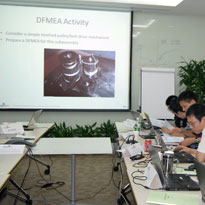Design of Experiments – Comprehensive
- Course:Design of Experiments – Comprehensive
- Course ID:DOE2 Duration:2+ days Where: Your Office (7+ Persons)
- Download Course Description (PDF)
Available as a private, customized course for your group at your offices or ours and in some cases as a WebLive(TM) class.
Course Outline
Day 1: Product and Process Optimization
- Introduction
- The product design process
- Developing manufacturing processes
- The history and nature of tolerances
- Tolerance assignment practices
- Attributes versus variables data
- Developing appropriate acceptance tests
- Reliability testing versus acceptance testing
- Operating characteristic curves and their application
- Acceptance testing risk
- Hypothesis testing
- Using z-tests and t-tests for hypothesis testing
- Excel’s features for evaluating the normal curve, the z-test, and the t-test
- ANOVA history
- The f-test
- ANOVA’s mathematical underpinnings
- Using Excel to accelerate ANOVA
- Case studies
Day 2: Fractional Factorial Experiments
- Brief review of prior material
- The “scientific method” versus design of experiments
- Full factorial experiments
- Fractional factorial experiments
- Taguchi philosophies
- Taguchi test approaches
- Identifying potential test parameters
- Selecting the appropriate Taguchi matrix
- Assigning factors to Taguchi columns
- Assessing potential factor interactions
- Identifying appropriate factor levels
- Defining Taguchi test sample configurations
- Identifying appropriate output parameters for evaluation
- Minimizing Taguchi test risks
- Mathematically evaluating Taguchi test results
- Assessing signal-to-noise significance
- Follow-on Taguchi tests
- Using Excel features to accelerate the process
- Case studies
- Recap, Q/A, and evaluations
(Optional Third-day): Experiment Design Workshop
The participants will work together under the instructor’s guidance to analyze a product or process design issue in your organization.
Course in a Nutshell
This course brings together important concepts that give your technical staff the capability to optimize product designs and manufacturing processes using advanced design of experiments technologies.
We will briefly review basic statistical concepts and then move on to more advanced design of experiments concepts. The course provides an organized approach for systematically and quantitatively defining key performance parameters in both the product design and the manufacturing process. The course utilizes real-life case studies that help your staff apply this toolkit. At the end of the course, your staff will know how to identify key performance parameters and determine appropriate control limits through appropriately-focused design-of-experiments tests.
Customize It!
Whatever the nature of your system and your objectives, we will customize the course to meet your specific needs and concerns. Here are some of the ways in which we can tailor the course to help you get more out of it:
- Add a “workshop day” (third day) to the course to allow the participants to work together to analyze a product or process design issue in your organization. The workshop day can be scheduled a few weeks after the course to allow time for applying the technologies presented in class under an experienced design of experiments practitioner’s guidance.
- Schedule post-class follow-up consultation for continuing in-house product and process optimization challenges.
Learn How To
- Work together in an effective team environment to resolve product and process optimization challenges.
- Use design of experiments technologies to identify key product design and process tolerances and control limits.
- Reduce or eliminate areas of specification non-compliance.
- Reduce or eliminate scrap and rework causes.
- Proactively eliminate potential product and process shortfalls before they occur.
Aimed At
This course is aimed at engineers, project engineers, design engineers, process engineers, program managers and others responsible for developing and optimizing product and process design.
Prerequisites
While there are no formal prerequisites, the course assumes a process, industrial, manufacturing, or engineering background.
- Industrial Statistics
- Design of Experiments
- Systems Engineering
- Thinking Out of the Box: A Systems Engineering Imperative
- Root Cause Analysis of Systems Failure – Comprehensive
- Root Cause Analysis of Systems Failure Overview
- Root Cause Analysis of Systems Failure in Depth
- Root Cause Analysis of Component Failure

